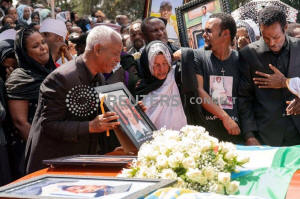|
Ethiopia says crashed jet's black boxes
show similarities to Lion Air disaster
 Send a link to a friend
Send a link to a friend
 [March 18, 2019]
By Maggie Fick and David Shepardson [March 18, 2019]
By Maggie Fick and David Shepardson
ADDIS ABABA/WASHINGTON (Reuters) - The
crash of an Ethiopian Airlines plane that killed 157 people had "clear
similarities" with October's Lion Air crash, Ethiopia said on Sunday,
shown by initial analysis of the black boxes recovered from the wreckage
of the March 10 disaster.
The crash has generated one of the most widely watched and high-stakes
inquiries for years, with the latest version of Boeing's profitable 737
workhorse depending on the outcome.
Both planes were MAX 8s, and both crashed minutes post take-off after
pilots reported flight control problems. Concern over the plane's safety
led aviation authorities to ground the model, wiping billions of dollars
off Boeing's market value.
"It was the same case with the Indonesian (Lion Air) one. There were
clear similarities between the two crashes so far," Ethiopian transport
ministry spokesman Muse Yiheyis said.
"The data was successfully recovered. Both the American team and our
(Ethiopian) team validated it," he told Reuters, adding that the
ministry would provide more information after three or four days.
In Washington, however, U.S. officials told Reuters the FAA and U.S.
National Transportation Safety Board (NTSB) had not yet validated the
data.

Boeing's safety analysis of a new flight control system known as MCAS on
MAX jets had several crucial flaws, one of which was that it understated
the power of the system, the Seattle Times said on Sunday.
The FAA also did not delve in detailed inquiries and followed a standard
certification process on the MAX, the paper said, citing an FAA
spokesman.
The FAA declined to comment on the report but referred to previous
statements about the certification process. It has said the process
followed FAA's standard process.
Citing people familiar with the inquiry, the Wall Street Journal said
Department of Transportation officials are scrutinizing the FAA's
approval of MAX jets and a Washington, D.C. grand jury issued a subpoena
to at least one person involved in the MAX's development.
The subpoena dated March 11 - a day after the Ethiopian Airlines crash -
listed as a contact a prosecutor from the Justice Department's (DoJ)
criminal division and sought documents to be handed over later this
month, the paper said.
It was not immediately clear whether the DoJ subpoena was related to the
DoT's inquiry, which focuses on MCAS, implicated in the Lion Air crash
that killed 189 people, the WSJ added.
Boeing and the FAA declined to comment on the WSJ report.
Two government officials briefed on the matter told Reuters it would not
be surprising for the Transportation Department to investigate a major
safety issue, but could not immediately confirm the report.
[to top of second column]
|

Relatives mourn next to coffins arranged during the burial ceremony
of the Ethiopian Airline Flight ET 302 crash victims at the Holy
Trinity Cathedral Orthodox church in Addis Ababa, Ethiopia, March
17, 2019. REUTERS/Maheder Haileselassie

SAFETY ANALYSIS
An official told Reuters that when investigators - after reviewing
black box data from the Ethiopian Airlines crash - return to Addis
Ababa to conduct interpretive work, the NTSB and FAA will assist in
verification and validation of the data.
A second source said little information had been circulated between
parties about the contents of data and voice recordings.
It was not clear how many of the roughly 1,800 parameters of flight
data and two hours of cockpit recordings, spanning the doomed
six-minute flight and earlier trips, had been taken into account in
the preliminary Ethiopian analysis.
International rules require a preliminary report on the crash to be
released within 30 days.
Previous air crash reports show that in such high-profile cases
there can be disagreements among parties about the cause.
In Paris, France's BEA air accident investigation agency said data
from the jet's cockpit voice recorder had been successfully
downloaded. The French agency said on Twitter it had not listened to
the audio files and the data had been transferred to Ethiopian
investigators.
In Addis Ababa, a source who has listened to the air traffic control
recording of the plane's communications said flight 302 had an
unusually high speed after take-off before it reported problems and
asked permission to climb quickly.
Last Monday, Boeing, shares of which have fallen 10 percent in the
week since the crash, said it would deploy a software upgrade to the
737 MAX 8, hours after the FAA said it would mandate "design
changes" in the aircraft by April.
Boeing was finalizing the software change and a training revision
and would evaluate new information as it became available, Chief
Executive Dennis Muilenburg said in a statement on Sunday, after the
Ethiopian transport ministry's comments.

A Boeing spokesman said the 737 MAX was certified in line with
identical FAA requirements and processes that governed certification
of all previous new airplanes and derivatives. The spokesman said
the FAA concluded that MCAS on 737 MAX met all certification and
regulatory requirements.
(Additional reporting Gaurika Juneja, Tim Hepher, Tracy Rucinski;
Writing by Sayantani Ghosh; Editing by William Maclean and Clarence
Fernandez)
[© 2019 Thomson Reuters. All rights
reserved.]
Copyright 2019 Reuters. All rights reserved. This material may not be published,
broadcast, rewritten or redistributed.
Thompson Reuters is solely responsible for this content. |